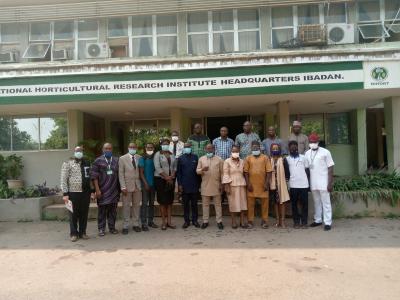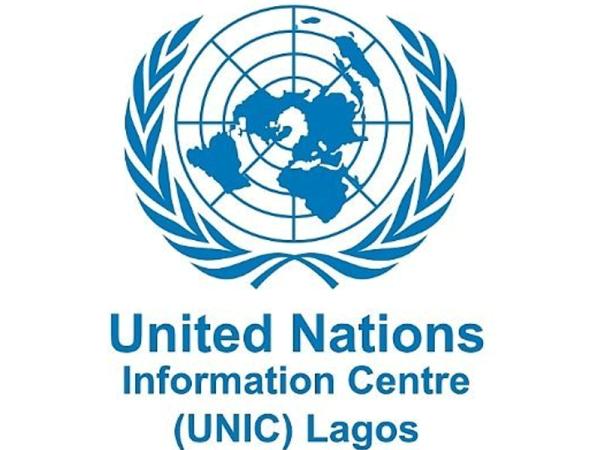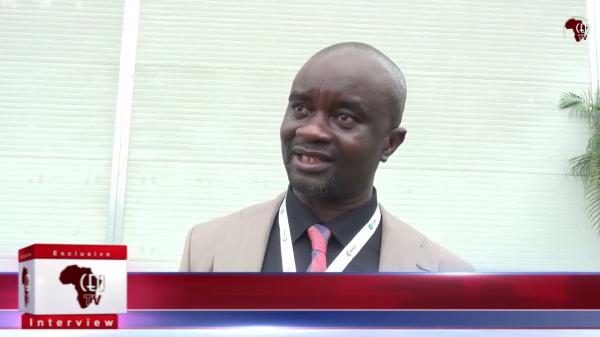
OCP Africa Fertilers in collaboration with the National Horticultural Research Institute (NIHORT) and Institute of Agricultural Research and Training, Moore Plantation, Ibadan, on Tuesday, 19th January, 2021 held a learning workshop/meeting ‘titled; End of Soil Mapping & Fertility Evaluation, Phase of OCP Funded Tomato Specialty Fertilizers Project In Nigeria.
The workshop which was held at the NIHORT premises had researchers who spoke on why tomatoes does not produce enough yield.
The researchers, in their findings discovered that farmers need to evaluate their soil before applying any form of fertilizer, stating that there is a specific fertilizer for a particular soil type.
In his speech, the Executive Director of NIHORT, Dr Abayomi A. Olaniyan, said Nigeria, compared to some countries, has a slow production of tomatoes due to the country’s arcade of tomatoes production and lack of specific fertilizer for the crop.
He said that the fact remains that the government cannot do it all alone and that is why the OCP group came in to move tomatoes production forward and tomatoes farming is one of their targets.
He said “the government cannot do it all alone that is why the OCP group came in to move tomatoes production forward and they are addressing productivity in tomatoes. The arcade of tomatoes production in Nigeria is higher than in Egypt, but Egypt is having a higher level of tomatoes production.
This project funded by OCP will address specific fertilizer application for tomatoes in which the yields will be higher than what has been recorded,” he stated.
Olaniyan added that having a locally made fertilizer that is specific to Nigeria’s soil, tomato-pepper crop will do the country a whole lot of good.
He also disclosed that OCP project specifically focuses on increased tomato-pepper productivity in the country.
According to him, the benefits to enjoy from the project, whether as an individual farmer or government are numerous.
He said “the project specifically focuses on yield increase even in term of health-wise, serving as food security, saving our country earnings and generating employment for our teeming youths”.
He however said that having sufficiency in the country, we will save our foreign exchange earnings. Also it will generate employments for the population.
On his part, Dr Bernard Okafor, a soil scientist in National Horticultural Research Institute, Ibadan also stated that why the tomatoes farmers don’t have enough yield was because they use all weather fertilizer for planting, and that is what the OCP project has come to address.
Okafor said though MPK fertilizers are used for tomatoes farming but they are not the best fertilizers to be used, because at times it degrades the soil.
He said “the essence of this study is for us to get Tomato-pepper specific fertilizer. What necessitated this study is that we use generic fertilizer which is all weather fertilizer (if I may say). That cannot give us good yield; fertilizer should be specific to the crop and the soil. Therefore, this study is aimed at producing that fertilizer that is specific to Nigeria soil and specific to tomato-pepper crop in Nigeria.
In Nigeria, we use MPK fertilizer and MPK is generic. As a matter of fact, in some cases it is degrading the soil. But what we advise is still Tomato-Pepper specific fertilizer in Nigeria and that will still be the best fertilizer.
So it believed that the output of this research work will give us the kind of fertilizer that the crop needs and suitable to our environment.
Most of the time the other option is to use integrated soil fertility management. It is when you combine the organic and the inorganic fertilizer as the case may be. But whatsoever that needs to be done should be based on soil test.
You don’t just dump fertilizer to the soil, when you do that you create issues of public health concern. But with good soil test, you will be able to calculate and then do precision agriculture giving the soil and the crop what they need” he added.
Speaking on the region that produces tomatoes in large quantity in Nigeria, he said “currently the northern part of the country produce tomatoes in large quantity, but this does not mean other part of the country does not have the capacity for the large production of tomatoes. It is about you planting at the right time.
Tomato is not a crop that enjoys too much moisture; it lives in a dry environment. But when you do land evaluation, land suitability classification, you will be able to identify its problem and know the best time to plant.
Tomatoes can do well in any part of the country only if we do the right thing.
We know that the North has comparative advantage because of land area, the weather and some other factor. But also in the South, if we can put things in order, like putting irrigation in order during the dry season, create the green houses and do protected agriculture, off course we can achieve whatever we want to achieve.
Once there is increase production in the South and increase production in the North then Nigeria will be better, he concluded.
Alhaji Saliu Imom, a tomato farmer and Chairman, Agric Development Farmers Association in Nigeria who said that he has been in the business for over 10years said that tomatoes farming is profitable because its a 3 months production cycle.
He said though tomatoes farmers are face with a lot of challenges which he said irrigation is a very serious problem to the business but steady workshops by OCP and NITHORT have been of help.
He therefore appealed to the federal ministry of agriculture to provide pumping machine at a subsidized price, seeds and others.





















